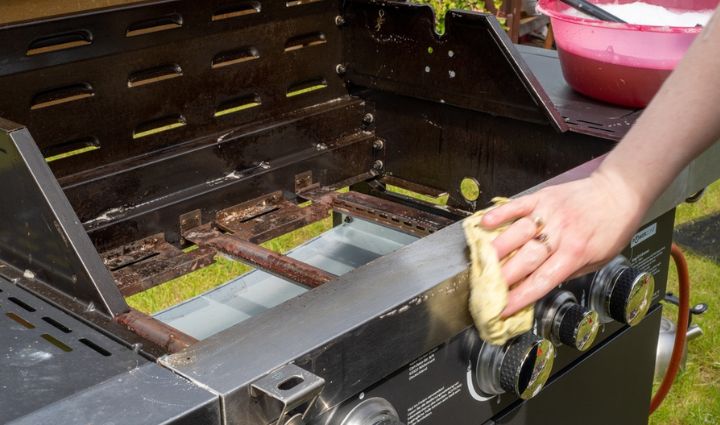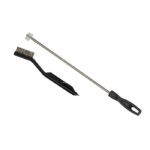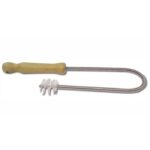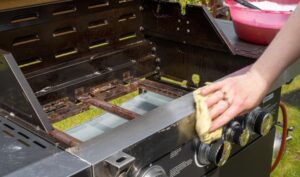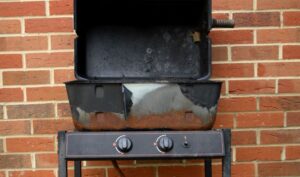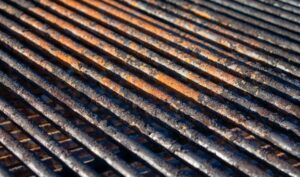The Complete Guide to Troubleshooting Gas Grill Issues is your source for step-by-step instructions on how to diagnose and fix the most common gas grill issues. Whether your grill isn’t heating properly, won’t stay lit, or simply has rusty parts, we’ve got the answers you need to get your gas barbecue firing on all cylinders.
If your grill won’t light properly—or it does light, but the flames are low and inconsistent—there are a number of possible causes to investigate.
In many cases, diagnosing these potential causes will involve partially disassembling and thoroughly cleaning your grill. In the process of disassembling and diagnosing your grill issues, you may make the unwelcome discovery that your burners are covered in rust. Don’t despair—rusted grill burners often look worse than they actually are and are fairly easy to repair.
In this section of the Complete Guide to Troubleshooting Gas Grill Issues, we’ll explore issues with rusted grill burners including:
- Signs you may have rusty grill burners
- How to clean your rusted grill burners
- How to repair or replace your rusted grill burners
- Preventative care
Let’s get cooking.
1. Signs You May Have Rusty Grill Burners
You may have rusty grill burners if:
- Your grill won’t light properly
- One or more of your burners won’t light
- The flames are low, sputtering, or yellow
Keep in mind that there can be more than one source for these issues. Thankfully, it is easy to confirm whether or not your burners are rusty. Simply remove the cooking grates and heat plates to visually inspect them. It should be immediately obvious if the burners are rusted or not. If they are rusted, it’s usually just a matter of cleaning, or—if the damage is significant—replacing them.
If they are not rusted, you may have a different problem with your grill:
- What to Do if Your Gas Grill Won’t Ignite
- How to Fix a Yellow or Orange Gas Grill Flame
- Troubleshooting Guide: Only One Burner Lights On My Grill
- Troubleshooting Guide: Gas Grill Won’t Stay Lit
2. How To Clean Rusted Grill Burners
Rust on your grill burners can often be cleaned with just a brush and a bit of elbow grease. With your brush close by, follow these steps to clean rusted grill burners:
- Remove the burners and use a bottle brush or special venturi brush to clean out the venturi tube of each burner.
- Use a wire brush or other needle-like object to remove any deposits or debris from each clogged port and restore normal gas flow. Do not brush lengthwise down the ports—brush across them to prevent the rust and debris from brushing into the ports and clogging them further.
- Replace the burners, heat plates (if your grill has them), and cooking grates, and fire up your grill. If you’re still having issues, you may have a different issue with your barbecue. Check out our Complete Guide to Troubleshooting Gas Grill Issues for our expert advice on diagnosing and repairing the most common gas grill problems.
3. How To Replace Rusted Grill Burners
If the burners are rusted so badly that they have cracked, the portholes are connected, or the burners are disintegrating, it is time to replace them.
Thankfully, replacing rusted grill burners is not actually as challenging as you might think. Follow these steps:
- Ensure the propane tank or gas line is turned off.
- Lift out the cooking grates and remove the heat plates (if your grill has them) and set them both aside.
- If you have an older grill that uses lava rock or ceramic briquettes, remove them along with the rock grate to access the burners.
- Remove the burners. Depending on the type of burner and how it is secured to the burner box, you may need to remove one or two screws with a screwdriver, or pull out the cotter pin before you can remove the burner.
- Once the burners are removed, give the burner box a thorough cleaning to help prevent flare ups and grease fires.
- Line up the new burner air intake, slip the burner onto the gas nozzle, and position the burner in the burner box. Resecure the burner by screwing it onto the burner box or reattaching the cotter pin.
- Replace the heat plates and burner grates.
- Turn on the gas.
For more detailed instructions, read our step by step guide to replacing gas grill burners.
4. Preventative Care
Now that your grill burners have been cleaned or replaced, set a reminder for yourself to clean them once or twice per year, or build these actions into your normal grill maintenance routine:
- Monitor your grill for signs of rust
- Clean your grill after each use
- Clean rust and stains off as soon as you see them
- Prevent rust with proper maintenance, as outlined by your grill’s manual
- Keep your grill covered to protect it from the elements
Conclusion
If your grill burners are rusted, the fix may be easier than you think. Often, all you need to do is clean them off with a brush to get your grill cooking again. If they’re rusted to the point of cracking or other signs of deterioration, you might need to replace them entirely.
Still struggling with your grill? Learn more about different grill problems, what causes them, and how to solve them in our Complete Guide to Troubleshooting Gas Grill Issues.

